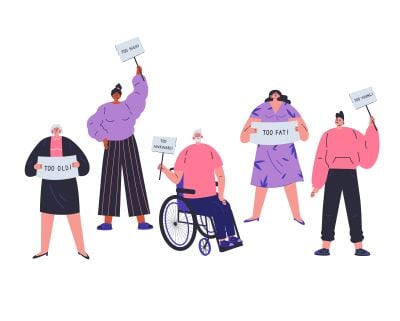Social Anxiety Due to Fears of Stereotype Confirmation
Social Anxiety Due to Fears of Stereotype Confirmation

“Do I sound too gay?”
“What if they think my name is ghetto?”
“They’re going to think I’m some kind of Jesus-freak.”
Fear of negative evaluations or judgments from others is a core feature of social anxiety. Yet, as illustrated in the quotes above, for people with certain social identities, these fears may often be specifically related to worries about confirming stereotypes related to the social groups to which they belong.
Stereotypes are oversimplified generalizations about groups or categories of people. In this blog article, you will learn more about the connection between stereotypes and social anxiety, as well as ways to manage social anxiety that occur as a result of stereotypes.
Within psychology, stereotype confirmation concern is a term used to describe the persistent worries people have about appearing to validate negative stereotypes concerning social groups to which they belong. While most research has focused on people with marginalized racial identities, stereotype confirmation concerns can affect anyone who experiences prejudice or discrimination based on some aspect of their social identity. This includes disability, gender, sexual, socioeconomic, and religious identities to name a few.
How Stereotype Confirmation Triggers Social Anxiety
One of the primary assumptions individuals with social anxiety believe is that other people are inherently critical. Due to this assumption, people with social anxiety also believe that the probability they will be judged negatively by others is very high.
When people have stereotype confirmation concerns, they more specifically believe that judgments from others will be based on acting in ways that seem to confirm stereotypical images of people who belong to their social group. Referring back to the quotes at the beginning of this article, examples of this may include a gay athlete worrying about being perceived as weak or too feminine due to the sound of his voice; a Black woman worrying about being viewed as lacking standards or ability when meeting new colleagues at work because of her name; or a Christian man worrying about being perceived as strange when praying over his food in front of friends.
Fears like those presented in the examples above suggest that for some individuals, social anxiety may be more activated in mixed social situations, especially situations where the individual is typically underrepresented. Imagine the following scenario:
An African American woman, Keshia is one of three finalists for a branch manager position at a large banking institution. As part of the selection process, each finalist must give a presentation that includes a description of their approach to disciplining employees. While Keshia was generally well liked by colleagues when she was initially employed, she has consistently been met with resistance since receiving additional leadership responsibilities at the branch.
Keshia believes this resistance has been due to stereotypes about Black women being harsh and difficult to get along with. During her presentation, she notices that no one smiles. She worries that the all-White branch manager search committee also perceives her as difficult and harsh, thinking, “They probably see me as just another angry Black woman.” Keshia feels sick to her stomach and is unable to maintain eye contact throughout most of the presentation.
Dealing With Stereotype Confirmation Concerns
Like Keshia, you may find yourself in situations where you worry about acting in ways that confirm negative stereotypes about one of your social groups. Described below are some strategies you can use to help you deal with these fears:
Exposure Therapy and Experiments
Exposure therapy refers to interventions that help individuals take small, incremental steps toward engaging in feared situations. A benefit of these exercises is that they can increase your confidence in your ability to cope with threatening outcomes and reduce your sense of uncertainty in social situations. Generally, there are two types of exposure interventions: imaginal exposure and in-vivo exposure. Imaginal exposure involves picturing yourself in a feared situation as you implement various coping and relaxation strategies with the aim of becoming less distressed over time. Keshia, for example, may have imagined herself in work and social situations where she is the only African American woman interacting with people of different racial groups.
In-vivo exposure, on the other hand, involves directly engaging in a feared situation. Research shows that this type of exposure when experimental in nature is generally more effective in the treatment of social anxiety, especially when individuals experience an element of shame. This is because it allows you to directly test the beliefs that lead to your anxiety. For Keshia, some examples of in-vivo exposures may include attending predominantly White social or networking events.
Whether engaged in imaginal or in-vivo exposure, it is important to keep in mind that at times people do respond to others based on stereotypes. Therefore, any exposure exercises you complete should include giving yourself messages that affirm your identity and attribute your anxiety to your lived experience as a member of your social group (rather than a deficit within yourself.)
Cognitive Restructuring
Once you have learned to tolerate and manage distress you may experience when confronted with anxiety-provoking social situations, it can be useful to examine automatic thoughts and core beliefs that contribute to your anxiety. Automatic thoughts refer to the words, images, or memories that go through your mind in daily situations. For example, Keshia’s automatic thought in the scenario presented above was, “They probably see me as just another angry Black woman.” Core beliefs are the ways we think about ourselves, as well as the ways we think about how other people perceive us. Based on her automatic thought, Keshia’s core belief may have been, “I don’t fit in.”
Cognitive-behavioral therapy (CBT) is one type of treatment found to be effective in helping us deal with unhelpful automatic thoughts and core beliefs. In CBT, the primary goal is learning how to identify the distorted and self-defeating thoughts and beliefs that lead to social anxiety, as well as how to evaluate and modify these thoughts and beliefs. This is based on the idea that our thoughts, rather than the situations we encounter, are the primary source of our emotions. If you have severe social anxiety, you should seek the help of a trained CBT therapist who specializes in social anxiety. If you are interested in learning more about the types of interventions used by CBT therapists you may be interested in the watching some of the free videos found here on the National Social Anxiety Center’s (NSAC) website.
Self-Compassion
Because the content of stereotypes may be deeply painful, self-compassion is another tool that can be helpful in managing social anxiety as a result of stereotype confirmation concerns. Self-compassion involves being non-judgmental, loving, kind, accepting and caring toward yourself. There are many ways to practice self-compassion. One way to practice self-compassion is through meditation. A self-compassion meditation, such as a loving-kindness mediation, can teach you ways of thinking about and relating to yourself that challenge negative perceptions based on stereotypes.
Role-play is another strategy that can facilitate self-compassion in the midst of social anxiety. Generally, research has shown that role-plays which allow us to practice responding to our negative beliefs as someone who is observing our social performance are particularly effective in improving self-compassion. This process of standing in the observer’s role helps us to see ourselves with greater accuracy as well as to help us counteract thoughts about the negative perceptions of others. Compassion during these role-plays can be achieved by responding to fears of confirming stereotypes in ways that are kind and sympathetic and that validate your experiences as a member of your social group.
Conclusion
Social anxiety due to stereotype confirmation concerns can be deeply painful. The strategies above are just a few of the techniques you can use to manage social anxiety you may experience due to stereotype confirmation concerns. If you need treatment for social anxiety, please visit NSAC’s Regional Clinics and Associates page or ADAA' s Find Your Therapist directory to find a licensed professional that can serve you in your area.
Special thanks to the National Social Anxiety Center (NSAC) for contributing this blog for the ADAA community as part of our ongoing collaboration.




















